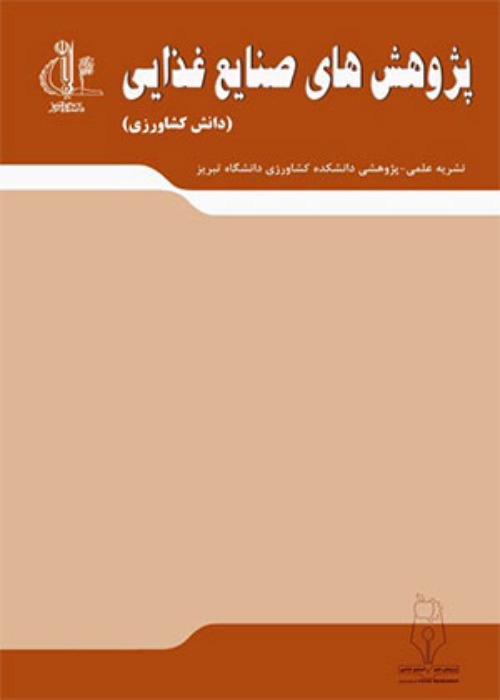Quantitative and Qualitative Control of Some of Aromatic Herbal Tea in the Market in Iran
Author(s):
Article Type:
Research/Original Article (دارای رتبه معتبر)
Abstract:
Background
Herbal teas can be used for various therapeutic or nutritional purposes, depending on the chemical constituents. Quality control of products containing medicinal plants is important. Today, consumers' desire for herbal teas that have good aroma, taste and sensory properties is increasing. Herbal tea ingredients include one or more herbal species that are combined to improve taste and increase health. Quality control of herbal teas, like other nutritional supplements, is important to ensure safety and efficacy. Current methods are chromatography-based and require sample preparation. In some countries, researchers have used the ultra spectral imaging method as a fast and non-destructive method for quality control of medicinal plants and herbal teas.Method
In this research, the quantitative and qualitative control of five herbal tea bags including Chamomile, Fennel, Lavender, Spearmint and Thyme were conducted. In terms of the kind of the plant, the ash content, the essential oil and their active substance were determined. Microscopic tests were carried out to ensure the type of plant, total ash and acid-insoluble ash were done with the method introduced in the references. Extraction of essential oils was done by water distillation and analysis of essential oil and determination of the major compounds was done by gas chromatography (GC). The essential oil of each sample was diluted with normal hexane solvent at a ratio of 1 to 10 and injected into the gas chromatography with the following information: Agilent 7890A GC device, injection temperature 250°C, thermal programming 60-220°C, column type HP-5MS, nitrogen as carrier gas, flow intensity 2 ml/min, temperature increase speed 6°C per minute, column length 30 meters, internal diameter 250 microns and FID detector. The ionization voltage was 70 electron volts, the ionization method was EI, and the temperature of the ionization source was 250 degrees Celsius. The temperature program of the column was set as follows: the initial temperature of the oven was 50 °C and stopped at this temperature for 5 minutes, the thermal gradient was 3 °C per minute, the temperature increased to 250 °C and stopped at this temperature for 10 minutes, the temperature of the injection chamber was 290 degree Celsius and the carrier gas was used with a flow rate of 1.1 mm/min.Results
: By micrographic study, compatibility of the herbal contents were confirmed in tea bags with Iranian Herbal Pharmacopoeia (IHP). According to the TLC tests results, Rf values of anethol in Fennel essential oil, linalool and linalyl acetate in Lavender essential oil, thymol and carvacrol in Thyme essential oil and carvone in Mint were 0.88, 0.3, 0.75, 0.55 and 0.5 respectively. Chamomile sample had not essential oil. The total ash and acid-insoluble ash were respectively 1% and 8% for fennel, 5% and 13% for lavender, Were2.03 % and 7.5%, respectively for chamomile, 2.5% and 8% for Spearmint and 1% and 11% for Thyme. Based on GC analysis, amount of anethole in the essential oil of fennel, carvone in Spearmint essential oil, thymol in Thyme essential oil and linalool in Lavender essential oil were 0.098, 0.621, 0.019, 0.164 gr/ ml respectively.Discussion and Conclusion
In recent years, people's approach to medicinal plants and their products has increased. Every year, 50% are added to people who turn to the use of medicinal plants. Participating in such a large market and creating and developing the herbal medicine industry requires special attention to the production, processing, quality enhancement, standardization and safety of these products. It should be noted that factors such as the age of the plant, place and time of harvesting, drying method, storage conditions, production process, packaging method, etc. are effective on the quality of the plant and of course its effects, and therefore quality control and standardization are important. Post-harvest processes of the medicinal plants are very important in the production cycle of herbal products. Preservation of color, smell, taste, chemical nature and quality of active substances of medicinal plants has always been important for researchers and many studies have been done in this regard in recent years. Choosing the right method for drying medicinal plants depends on the type of organ, its moisture content and the purpose of drying. Finally, in the newer technologies, the minimization of changes is focused on plant raw materials.According to the results, Rf values were corresponded with standard indicators mentioned in the references. The total ash and acid-insoluble ash of Fennel, Spearmint and Chamomile were also correspond with the values available in Iranian Herbal Pharmacopoeia (IHP) but the mentioned values for Lavender and Thyme were not in compliance with reference. It is recommended to carry out periodic tests on herbal products after entering the market (PMS) to ensure the proper quality of the products. The outcome of this study can help to establish quality parameters for the standardization of herbal teas at the supply level.Keywords: Thyme, Lavender, Chamomile, Fennel, Spearmint, Quality control, Herbal teaKeywords:
thyme , Lavender , Chamomile , Fennel , Quality control , Herbal tea
Language:
Persian
Published:
Journal of Food Research (AGRICULTURAL SCIENC), Volume:33 Issue: 3, 2023
Pages:
111 to 123
magiran.com/p2607348
دانلود و مطالعه متن این مقاله با یکی از روشهای زیر امکان پذیر است:
اشتراک شخصی
با عضویت و پرداخت آنلاین حق اشتراک یکساله به مبلغ 1,390,000ريال میتوانید 70 عنوان مطلب دانلود کنید!
اشتراک سازمانی
به کتابخانه دانشگاه یا محل کار خود پیشنهاد کنید تا اشتراک سازمانی این پایگاه را برای دسترسی نامحدود همه کاربران به متن مطالب تهیه نمایند!
توجه!
- حق عضویت دریافتی صرف حمایت از نشریات عضو و نگهداری، تکمیل و توسعه مگیران میشود.
- پرداخت حق اشتراک و دانلود مقالات اجازه بازنشر آن در سایر رسانههای چاپی و دیجیتال را به کاربر نمیدهد.
In order to view content subscription is required
Personal subscription
Subscribe magiran.com for 70 € euros via PayPal and download 70 articles during a year.
Organization subscription
Please contact us to subscribe your university or library for unlimited access!



